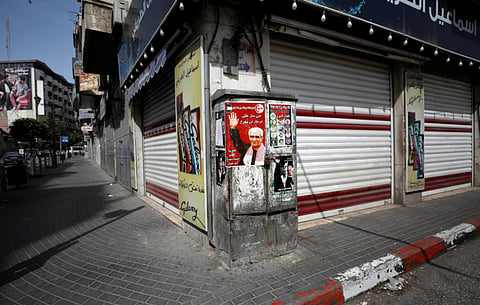Palestinians strike in support of protesting prisoners
Stores were closed and roads empty across the West Bank, the Palestinian territory occupied by Israel for 50 years

Ramallah: Palestinians held a general strike on Thursday in solidarity with hundreds of prisoners in Israeli jails on hunger strike for 11 days, with some officials calling it the largest in years.
Stores were closed and roads empty across the West Bank, the Palestinian territory occupied by Israel for 50 years.
In the city of Ramallah, several dozen people gathered at a tent set up in a central square where a protest march was to begin.
“This general strike is unprecedented in years,” said Khalil Rizeq of the Union of Palestinian Chambers of Commerce.
“All Palestinian industries, such as transport, bakeries, stores, all of the private sector and commercial institutions are participating in the strike.”
The strike was called in all cities in the West Bank, with only doctors and students nearing graduation excluded.
Palestinian bus services were also on strike in Israeli-occupied East Jerusalem.
Oday Humaid, an engineer, arrived at Ramallah’s Yasser Arafat Square with other workers from his lift maintenance company to participate in the protest.
It was the “minimum that we can do for our prisoners,” he said.
Munther Karaja, who had closed his pastry shop, said: “We can sacrifice one day for the prisoners who have given years of their lives.”
Palestinian officials say some 1,500 prisoners are participating in the hunger strike that began on April 17, with detainees ingesting only water and salt.
Israeli authorities have put the number at around 1,200.
Some 6,500 Palestinians are currently detained by Israel for a range of offences and alleged crimes.
Around 500 are being held under Israel’s system of administrative rarely detention, which allows for imprisonment without charge.
Palestinian prisoners have held repeated hunger strikes, but not on such a scale.
The hunger strike is being led by Palestinian leader and prominent prisoner Marwan Barghouti, serving five life sentences over his role in the second Palestinian intifada, or uprising, of 2000 to 2005.
The prisoners have issued demands ranging from better medical care to phone access.
A series of demonstrations have been held in the West Bank in support of the prisoners, occasionally resulting in clashes with Israeli occupation forces.
Barghouti is popular among Palestinians, with polls suggesting he could win the Palestinian presidency.
A Palestinian NGO said this week that Barghouti’s health has seriously deteriorated and that he was refusing medical treatment.
Palestinian leaders have denounced Israel’s refusal to negotiate with the hunger strikers, warning of a “new intifada” if any of them die.


